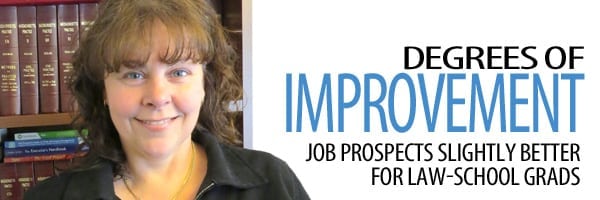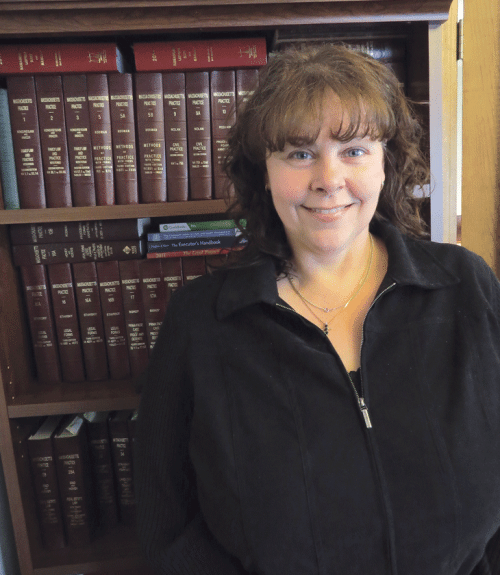
Degrees of Improvement
Job Prospects Are Getting (Slightly) Better for Law-school Grads
Eric Gouvin was asked to qualify the state of the job market for recent law-school graduates, and especially those at Western New England University School of Law, which he serves as dean.He thought about it for a moment, and then, when asked to find a word or two or three to sum things up, he paused again before saying, “well … it’s not terrible.”
He would go on to elaborate, using more numbers than words, to convey the general opinion that what seems like a simple question doesn’t have a simple answer. That’s because these are intriguing and certainly challenging times for those looking to enter the legal profession, and the scene is changing, in some ways quickly and profoundly, and in others slowly and — at least for some of those looking to land work — frustratingly.
What’s changing, said Gouvin, is the landscape in terms of the number and types of services for which lawyers are required. In short, there are fewer of them, with more matters handled by paralegals and those without a law degree.
What’s not changing, meanwhile, are both the overall appetite for bringing on new lawyers (many firms are still hesitant to do so even through the economy is certainly better than it was a few years ago) and the rate of retirement for the Baby Boomers who came into the profession when it was, well, booming 40-plus years ago.
In short, those legions of attorneys who entered the profession in the early and mid-’70s aren’t retiring — or at least at anything approaching the rates one might expect. There are many reasons for this, said Gouvin, including the Great Recession and its impact on everything from real-estate values to retirement savings, and the fact that many lawyers are more inclined to stay active and scale back their workload rather than fully retire.
Add all this up, and it translates into “not terrible,” which is, by and large, a slight enhancement over a few years ago, a vast improvement over 2010 and 2011 (the two worst years for finding work in this profession in quite some time), and roughly the same as last year.
“I’m cautiously optimistic that things are getting better,” said Gouvin. “But it will be pretty much like last year; as the economy improves, the prospects for law hiring improve.”
Gouvin and other law-school administrators won’t really know how the class of 2015 fares for several months — 10 months out from commencement is actually the benchmark used by those tracking placement and related issues — because many job offers are predicated on one’s passing the bar exam, and that grueling exercise won’t happen until July, and the results won’t be known until fall.
But Jeffrey Stitt Jr. won’t have to wait that long. He’s one of the members of this year’s class at WNEU who already has a job — in this case, with the firm of O’Connell & Aronowitz, which is based in Albany, N.Y. and also has offices in Saratoga and Plattsburg, N.Y., his hometown.
“It was always a hope of mine to begin my legal career here,” he said from home just two days after commencement ceremonies on the WNEU campus. “So I was very fortunate to have something work out.”

Jeffrey Stitt, seen just after WNEU Law’s commencement exercise on May 17, is one of the fortunate graduates who already have a job with a firm.
Karen told BusinessWest she entered law school with the intention of joining her father (O’Brien passed away several years ago), and that plan was jelling nicely until the elder Adamski became ill not long after she passed the bar and died a few months later.
She carries on by herself, handling everything from real-estate closings to estate-planning work, and said business is solid.
“Things have gone very well, surprisingly well,” she said, giving much of the credit for that to what she called a “support system” of other lawyers in that area who have provided help and mentoring.
As the examples of Stitt and Adamski clearly show, there are still ample opportunities to join this profession and have a law degree fulfill a long-held dream. Still, circumstances are making it more difficult to script such an outcome, and for some, the dream is being delayed or altered due to the challenging conditions.
Firm Resolve
After graduating from Westfield State University in 1989, Adamski eventually went to work for Hasbro, in R&D, where, among other things, she helped write content and rules for a number of games and supervised those who contrived the questions for Trivial Pursuit.
This was fun work and rewarding in several ways, but by 2010, she had made up her mind to plot a significant course change career-wise, join the legal profession, and essentially fulfill a childhood ambition that had been put on ice for more than two decades.
“Growing up and being around my father, I always had an interest in the law,” she explained. “But life got in the way, and it kept getting pushed off. At the time, Hasbro was changing its structure, and I was reassessing what I wanted to do with the next phase of my life. I decided that, if I was ever going to this, this was the time to do it.”
The timing of her decision is significant because 2010 was when the bottom started falling out in terms of both the legal job market and the numbers of individuals who were opting to pursue a law degree.
Gouvin noted that, for the fall semester in 2010, Adamski was one of 52,488 first-year law students enrolled in schools across the country. By the fall of 2014, that number had declined to 37,924, a startling 28% contraction, as schools reacted to a sharp decline in applications by shrinking the size of the classes.
Meanwhile, the worsening conditions also made it more challenging for graduates to find jobs — or at least the kind of jobs they were hoping for when they entered law school, usually taking on large amounts of debt to do so.
“Between 2008 and 2011, big law firms were just shedding jobs left and right — I think the number was something like 60,000 law jobs were eliminated during that period,” Gouvin noted. “There were a lot of layoffs, and the market took a huge hit; that big class that enrolled in the fall of 2010 graduated into a market that was pretty moribund in terms of hiring.”
Adamski was well aware of these developments as she filled out the paperwork to pursue her juris doctor at WNEU on a part-time basis. But she decided this was a risk worth taking.
“I knew it was a difficult time,” she recalled. “Firms were cutting back, certainly, but those times also put a strain on the solo practitioner, which is what my father was. It’s a lot of work to keep an office up and running in a market that had an excess of attorneys in it and not as many jobs available; everyone’s in competition.
“The tough conditions were something I was aware of,” she went on, “but the desire to do it was enough for me to decide that I would take a chance, hope that the market would square up a little bit, and make a go of it.”
She was fairly confident that she would find a suitable opportunity working beside her father and eventually succeeding him. The second part of that equation happened much sooner than she expected, and she regrets that, but overall, she’s happy with her career change.
However, the sharp downward spiral in the legal job market has deterred many over the past several years, said Gouvin, noting that enrollment at WNEU, as at most other law schools across the country, is down significantly from the years just prior to the economic collapse of 2008, and there is no indication that they will start to swing back up any time soon.
Offering Testimony
That’s because of all those market forces he described earlier, a combination of change and stagnancy that has many thinking at least twice about pursuing a law career.
Stitt, however, was not in that category.
Like Adamski, he said he was well aware of how the landscape had changed in the legal profession during and after the Great Recession when he was mulling whether to go to law school and where.
But he was also not deterred by what he had heard and seen.
“I’ve always wanted to be a lawyer, and I wasn’t going to let the job market deter me,” he told BusinessWest. “Everything is pretty cyclical, and I think the job market is going to come back around over the next few years.”
Perhaps, but some things will have to go right for conditions to improve substantially, said Gouvin. One of them is the economy, which certainly appears to be heading in the right direction.

Eric Gouvin expects the job market for law grads to improve as the economy strengthens and Baby Boom-generation lawyers eventually retire.
“One of the things we keep waiting for is the retirement of Baby Boom lawyers — but they keep holding on,” Gouvin noted with a telling laugh, adding that this is a rather large constituency.
Indeed, in 1969, the total number of JDs graduating was 15,000, he said, citing statistics he’s repeated many times. In 1975, that number was 32,000, swollen by a large number of law schools that had recently attained accreditation, including WNEU, then known as Western New England College.
Meanwhile, the basic laws of supply and demand will generate improvement as well, said Gouvin.
“The good news moving forward is that, for the group that just entered in the fall, their job prospects should be good, assuming the economy continues to recover,” he explained. “The delta between the number of available jobs and the number of new lawyers seeking those jobs will be smaller, simply because there will be a lot fewer lawyers graduated.”
Stitt acknowledged that he is more fortunate than many of his classmates — not only finding a job but one in his hometown — but noted that there are certainly opportunities to be found for those who are diligent and make full use of the resources that WNEU makes available to its law-school students.
“Like anything, there has to be a lot of initiative on your part,” he explained. “And they [WNEU administrators] give us the tools, and they also bring a lot of law firms from the Hartford-Springfield area onto the campus as well.
“Going back to when I was a 1L [the first year of law school] … they always preach to use the school’s externship programs and clinic programs to really shorten that learning curve when you get out of school and into practice,” he went on, adding that these programs can also help make a candidate more attractive to potential employers.
Summary Judgment
As for Adamski, she said keeping the name O’Brien & Adamski Law Office has been one of many factors that have contributed to what she considers a solid start to her career in the law.
“I kept that name because it has equity — it’s been around since 1972,” she explained, adding that many of her father’s clients have stayed with the firm, and she has brought in a number of new ones, including friends, colleagues from previous jobs, and people she knew through law school.
Hers was a plan that didn’t go entirely according to script, but in many ways has unfolded as she envisioned — just on a different timetable.
Many recent and current law-school graduates may well wind up using similar language but in different contexts as they strive to put their degrees to work.
Such is life in this changing environment, one where ‘not terrible’ actually constitutes improvement.
George O’Brien can be reached at [email protected]






